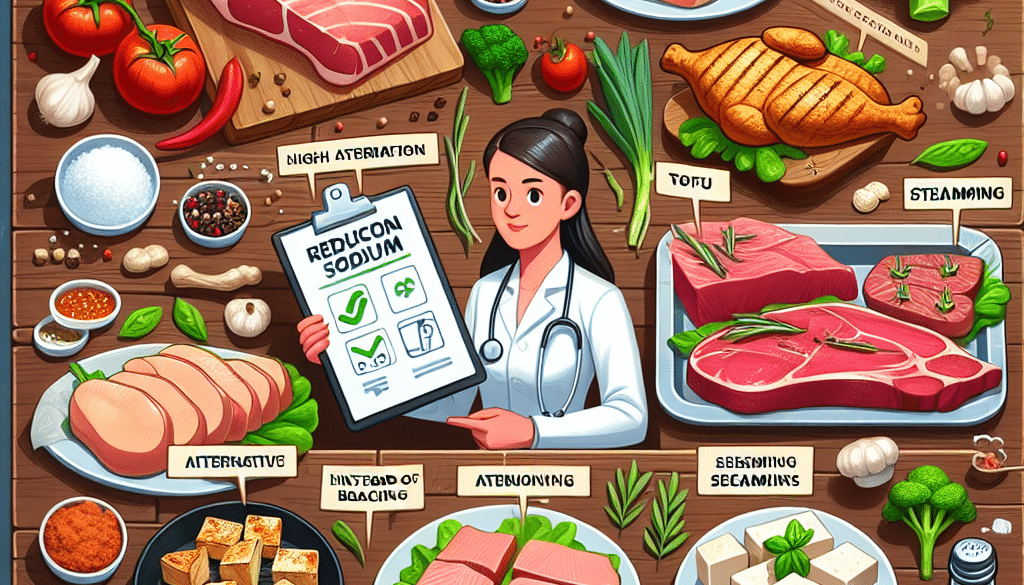Sodium Reduction Techniques in Protein Preparations: Health Hacks
-
Table of Contents
- Sodium Reduction Strategies in Protein-Rich Foods: Health Hacks
- Understanding the Impact of Sodium on Health
- Techniques for Reducing Sodium in Protein Preparations
- Case Studies and Examples of Sodium Reduction
- Statistics on Sodium Reduction and Consumer Preferences
- Implementing Sodium Reduction in Home Cooking
- Conclusion: Embracing Low-Sodium Protein Options for Better Health
- Discover ETprotein’s Low-Sodium Protein Products
Sodium Reduction Strategies in Protein-Rich Foods: Health Hacks

Excessive sodium intake is a significant health concern globally, often linked to hypertension and cardiovascular diseases. As consumers become more health-conscious, the demand for low-sodium protein products has surged. Protein preparations, whether for direct consumption or as ingredients in various dishes, are essential in a balanced diet. However, they can also be a hidden source of sodium. This article explores various sodium reduction techniques in protein preparations, offering health hacks for those looking to maintain a nutritious diet without compromising on flavor.
Understanding the Impact of Sodium on Health
Sodium is a crucial mineral for bodily functions, including nerve impulse transmission and muscle contraction. However, the modern diet often contains excessive sodium, primarily through salt (sodium chloride) and other sodium-containing additives. The World Health Organization recommends a sodium intake of less than 2,000 mg per day, yet many adults exceed this limit, leading to health issues such as high blood pressure, stroke, and heart disease.
Techniques for Reducing Sodium in Protein Preparations
Reducing sodium in protein-rich foods doesn’t have to mean sacrificing taste. Here are several effective strategies:
- Herbs and Spices: Enhancing flavor with herbs and spices can reduce the need for added salt. Experimenting with combinations like garlic, onion, paprika, and turmeric can add depth to the taste without the sodium.
- Marination: Marinating proteins in acidic liquids like lemon juice or vinegar can tenderize and flavor the protein, reducing the need for salt.
- Alternative Seasonings: Utilizing salt substitutes or seasonings like nutritional yeast, which has a cheesy flavor, can provide a savory taste without the added sodium.
- Low-Sodium Cooking Techniques: Methods such as steaming, grilling, and baking can bring out natural flavors, decreasing the reliance on salt for taste.
- Portion Control: Simply reducing the portion size of protein can lower overall sodium intake while still providing essential nutrients.
Case Studies and Examples of Sodium Reduction
Several food manufacturers have successfully reduced sodium in their products without compromising on taste. For instance, a popular brand of turkey breast reduced sodium by 40% by using a blend of potassium chloride and natural flavorings. Another example is a line of canned beans that has introduced a “no salt added” option, relying on the natural flavors of the beans and spices to satisfy consumers.
Statistics on Sodium Reduction and Consumer Preferences
Consumer demand for low-sodium options is on the rise. According to a survey by the American Heart Association, nearly 60% of consumers are trying to reduce their sodium intake. Furthermore, a study published in the Journal of Food Science showed that a gradual reduction of sodium in products can go unnoticed by consumers, allowing for health benefits without affecting sales.
Implementing Sodium Reduction in Home Cooking
Home cooks can also adopt sodium reduction techniques:
- Read Labels: Choose low-sodium or no-salt-added versions of ingredients like broths, sauces, and canned goods.
- DIY Seasoning Mixes: Create your own seasoning blends without added salt to control the sodium content in your dishes.
- Use Fresh Ingredients: Fresh vegetables, meats, and other protein sources typically contain less sodium than their processed counterparts.
- Portion Sizes: Serve smaller portions of protein and fill the plate with a variety of vegetables and whole grains to balance the meal.
Conclusion: Embracing Low-Sodium Protein Options for Better Health
Reducing sodium in protein preparations is a crucial step towards a healthier diet. By utilizing herbs, spices, and alternative cooking techniques, it’s possible to create delicious, protein-rich meals with lower sodium content. As consumer awareness grows, the food industry continues to innovate, offering more low-sodium products that cater to health-conscious individuals. By incorporating these health hacks into our diets, we can enjoy the benefits of protein while minimizing the risks associated with high sodium intake.
Discover ETprotein’s Low-Sodium Protein Products
If you’re looking for high-quality, low-sodium protein options, ETprotein offers a range of products that fit the bill. Their organic bulk vegan protein and plant proteins are not only low in sodium but also non-GMO and allergen-free, making them an excellent choice for health-conscious consumers and manufacturers alike.
About ETprotein:
ETprotein, a reputable protein Chinese factory manufacturer and supplier, is renowned for producing, stocking, exporting, and delivering the highest quality organic bulk vegan protein and plant proteins. They include Organic rice protein, clear rice protein, pea protein, clear pea protein, pumpkin seed protein, sunflower seed protein, mung bean protein, peanut protein etc. Their offerings, characterized by a neutral taste, non-GMO, allergen-free attributes, cater to a diverse range of industries. They serve nutraceutical, pharmaceutical, cosmeceutical, veterinary, as well as food and beverage finished product distributors, traders, and manufacturers across Europe, USA, Canada, Australia, Thailand, Japan, Korea, Brazil, and Chile, among others.
ETprotein specialization includes exporting and delivering tailor-made protein powder and finished nutritional supplements. Their extensive product range covers sectors like Food and Beverage, Sports Nutrition, Weight Management, Dietary Supplements, Health and Wellness Products, and Infant Formula, ensuring comprehensive solutions to meet all your protein needs.
As a trusted company by leading global food and beverage brands and Fortune 500 companies, ETprotein reinforces China’s reputation in the global arena. For more information or to sample their products, please contact them and email sales(at)ETprotein.com today.














